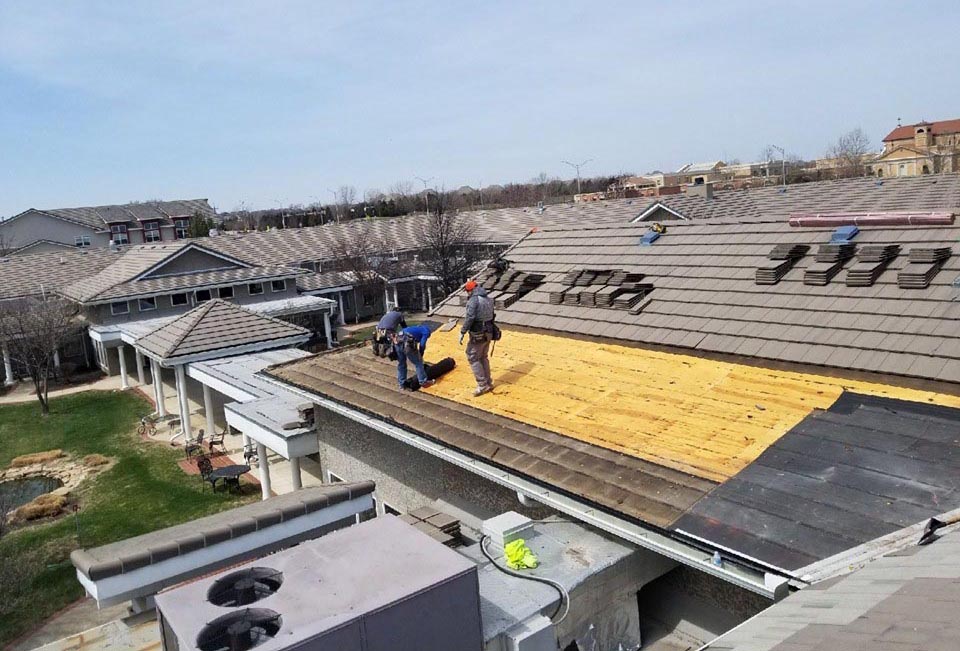Roof replacement usually happens when something’s broken beyond repair, or when it’s time to improve the home’s aesthetic or financial value. Sometimes it’s a combination of the two, with replacement the best way to invest in the home to improve it in the present and for the future.
Your home’s roof is the first barrier of protection against the outside world, and the slightest compromise to its structural integrity can have lasting negative consequences for your home’s condition. That means that your investment into your roof is a serious one that’s meant to provide a lifetime of benefits and long-lasting value. In other words, roof replacement isn’t cheap, and for good reason.
The bad news is that a roof replacement is a costly endeavor no matter how you approach this project. Not only do different roofing materials have different price points, but there are other costs to consider as well. That’s why before jumping into this type of project it’s important to determine what kind of budget you’re working with and how to pay for it. In this article, our experts at Smart Exteriors will reveal some of the most common financing methods that homeowners in Kansas City can use to pay for a roof replacement.
How Much Does Roof Replacement Cost?
Before we can take a look at different financing options it’s important to understand what a roof replacement costs. Keep in mind there are a number of factors that influence the total cost of your next project.
On average, the cost to replace a roof is roughly $7,000 over a 2,000 square foot home. The material you choose for your new roof will determine if you fall lower or higher on the cost scale. When checking on pricing, remember that the cost is listed as per square. This is shorthand for 100 square feet. Also, in most cases you’ll need to remove the current roof before installing the new one. This can cost between $1,500-$3,000.
Besides roofing material, the following factors also influence the final cost:
- Roof Size: The more square feet, the greater the cost.
- Roof Pitch: Different angles and slopes of the roof can affect the cost due to installation difficulty.
- Geography: Different states have different baseline costs. Also, different materials are more readily available in some areas of the country than in other parts.
- Local Building Codes: States, cities, and municipalities have different codes. You’ll want to ensure you’re compliant, which may affect the final cost.
- Roof Extras: It costs more to install roofing around existing chimneys, vents, skylights, and other similar roof features.
Should a Contractor Be Involved?
There is one other cost factor to consider, which is labor. If you do the roof replacement yourself, you can save big on labor costs. However, if you lack the knowledge or tools, this can cost you a lot more in the long run. That’s why we’ve put together a brief look at the three main contractor options for homeowners:
- DIY: It’s true that roof replacement is simple at its core. For starters, you have to remove the old roof before laying down the new one. Also, depending on the materials and equipment you’re using, most roofing products aren’t usually difficult to obtain. If you’re experienced in roofing or particularly handy, it is possible for homeowners to replace the roof themselves. However, we’re talking about something as important as a roof. One incorrectly installed shingle or tile can compromise the entire roofing system. In addition, some materials such as slate or tile are heavy, which may require reinforcement of the roofing system. Unless you’re very experienced in roofing and construction, or facing the most simple roof replacement possible, a roof replacement is one project to leave in the hands of professionals.
- Unlicensed Contractor: In fairness, it can be difficult and costly for contractors to stay on top of every code and regulation. This is due to licensing rules varying state by state. You may be tempted to go with an unlicensed contractor because they’re cheaper upfront compared to a licensed contractor. While you may save money in the initial run, the truth is this will cost you dearly in the future. You can’t count on an unlicensed contractor to install the roof properly. Plus, most installations done this way actually void any applicable warranties.
- Licensed Contractor: A licensed contractor will know the building codes inside out. They will also know what permits are needed as well as check for existing damage prior to roof installation. Most importantly, they’ll install in a manner that’s warranty compliant. As a bonus that shouldn’t be ignored, licensed contractors are able to guarantee their work. Should something go wrong due to incorrect installation, the contractor will fix it according to the terms of the workmanship warranty*. That’s worth the higher upfront cost all by itself.
Sizing up the Options
Now that you know what to expect when it comes to cost, let’s talk about financing. There are numerous ways to finance a roof replacement. Some like a personal loan should be avoided if at all possible due to the high-interest rates involved with such financing. The smartest financing options for a roof replacement are:
- Cash: If you have the money on hand, there is no smarter option. You’ll not have to worry about interest rates or an incomplete roof replacement due to a lack of funds. However, this is the hardest for homeowners due to the high need for existing savings. Sometimes, a roof replacement won’t wait for your savings to grow.
- Credit: This type of financing is quite common for this type of project. With the appropriate credit profile, options such as a home equity loan or if the project is small enough, a credit card, can be viable solutions. Keep in mind that credit cards and loans traditionally have high-interest rates. This can cause you to pay back more than the cost of the project by the time you’re done.
- Insurance Coverage: If the roof was recently damaged by problems such as theft, storms, or any other covered incident, you should consider going through your insurance provider. You’re already paying for the coverage; so make it work for you. Keep in mind that roof replacement due to age or lack of maintenance isn’t covered, so this may not be a viable option for everyone.
- Company Financing: A lot of companies will offer in-house financing to help cover the cost of a roof replacement as well as other projects. These companies partner with a range of banks, which allows them to offer a better and more attractive financing offer than traditional credit options.
Smarter Solutions for Your Home
As a premier roof replacement company, the team at Smart Exteriors proudly offers flexible financing options to its customers. We work hard to make every project an affordable and easy process due to our customer-first mentality.
If you’re ready to discover your financing options, give us a call to speak with one of our agents about our roof replacement services or fill out our online form to schedule your free assessment and pricing estimate.
*ask us for details on our Lifetime Workmanship Warranty

